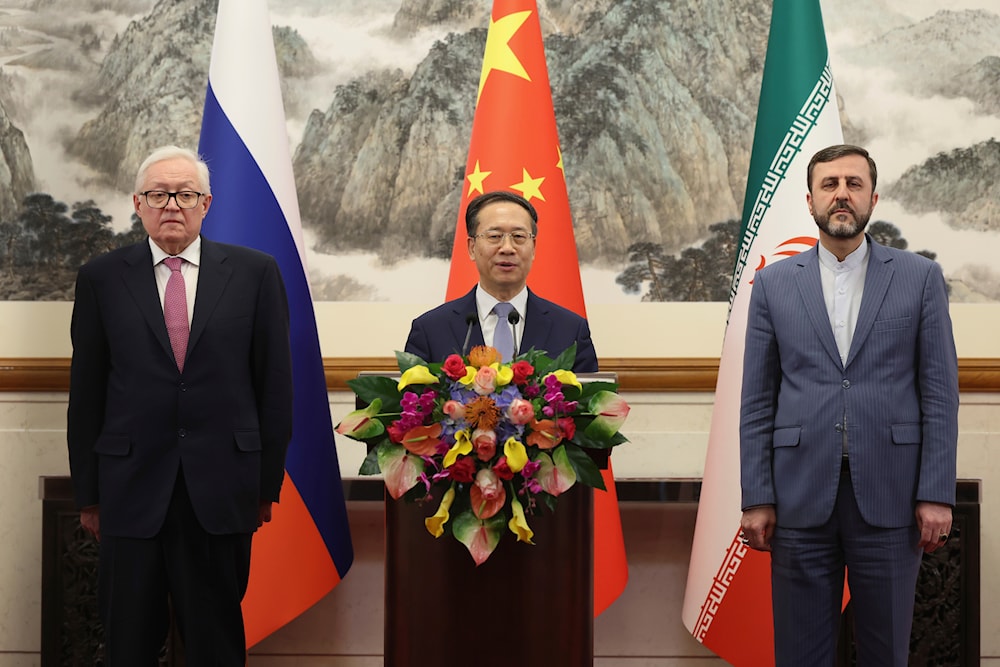China calls for end to ‘illegal’ sanctions at Iran talks
Iran’s Deputy Foreign Minister Gharibabadi describes the Beijing talks as "constructive" and reiterates that Iran’s nuclear program "is peaceful in nature."
-

From left, Russian Deputy Foreign Minister Sergei Ryabkov, Chinese Vice Foreign Minister Ma Zhaoxu and Iranian Deputy Foreign Minister Kazem Gharibabadi, meet with reporters after their meeting at Diaoyutai State Guest House on March 14, 2025 in Beijing, China. (Pool Photo via AP)
China has urged an end to "illegal" sanctions on Iran while hosting Iranian and Russian diplomats for discussions aimed at restarting long-stalled negotiations on Tehran’s nuclear program.
The 2015 nuclear deal collapsed when US President Donald Trump withdrew from the agreement during his first term. Since returning to office in January, Trump has called for a new deal, but Iran insists no agreement is possible as long as severe sanctions remain in place.
On Friday, China hosted Iranian Deputy Foreign Minister Kazem Gharibabadi and Russian Deputy Foreign Minister Sergei Ryabkov, hoping to "resume dialogue and negotiation at an early time."
Chinese Foreign Minister Wang Yi emphasized that the nuclear deal was a major diplomatic achievement and warned that the situation had reached a “critical juncture.” He urged all sides to "buy time for peace, resolve disputes through political and diplomatic means, and oppose the use of force and illegal sanctions."
Beijing's Foreign Ministry also called on the US to show "political sincerity and return to talks at an early date," adding that "all parties should... refrain from actions that might escalate the situation."
Iran defends its nuclear program
Iran’s Deputy Foreign Minister Gharibabadi described the Beijing talks as "constructive" and reiterated that Iran’s nuclear program "is peaceful in nature."
"Our nuclear program has never been diverted to non-peaceful purposes," he insisted, accusing some countries of attempting to "create an unnecessary crisis." He blamed the current situation on "the unilateral withdrawal of the United States."
Earlier on Friday, Gharibabadi and Ryabkov met China’s Vice Foreign Minister Ma Zhaoxu to discuss the Iranian nuclear issue and other topics of mutual interest. Ma reaffirmed Beijing’s support for a diplomatic solution based on "mutual respect" and called for "ending all illegal, unilateral sanctions."
"The relevant parties should work to eliminate the root causes of the current situation and abandon sanctions, pressure, and threats of the use of force," Ma stated.
Iran’s ambassador to China later described the meeting as a "complete success," highlighting agreements on "trilateral cooperation on important international issues, including the need for the three countries to cooperate in confronting" US sanctions.
Meanwhile, Kremlin spokesperson Dmitry Peskov stressed the need for continued diplomatic efforts and condemned "illegal" sanctions imposed on Iran.
The wider scope
The urgency for renewed diplomacy increased last month after the UN’s International Atomic Energy Agency (IAEA) reported that Iran had significantly expanded its stockpile of highly enriched uranium (reaching 60% purity)—just short of weapons-grade levels.
Meanwhile, Washington escalated its pressure campaign this week, sanctioning Iranian Petroleum Minister Mohsen Paknejad and blacklisting firms involved in Iran’s oil trade with China. Trump also sent a letter to Iranian leader Sayyed Ali Khamenei urging nuclear talks and warning of potential military action if Tehran refuses.
Sayyed Khamenei reaffirmed Iran’s longstanding position, stating, "We do not have nuclear weapons and are not seeking them," maintaining that Tehran’s nuclear activities remain peaceful.
Read next: Not seeking war, will respond decisively, certainly: Sayyed Khamenei

 3 Min Read
3 Min Read








